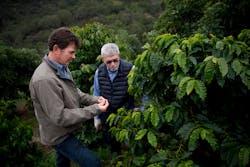Researchers Sequence Arabica Coffee Genome
The first public genome sequence for Coffea arabica, the species responsible for more than 70 percent of global coffee production, was released by researchers at the University of California, Davis. The university reports that sequencing of the Coffea Arabica genome is meaningful for California where coffee plants are being grown commercially for the first time in the continental U.S., specifically at Good Land Organics farm near Santa Barbara, CA. (Read more about Good Land Organics here.)
“This new genome sequence for Coffea arabica contains information crucial for developing high-quality, disease-resistant coffee varieties that can adapt to the climate changes that are expected to threaten global coffee production in the next 30 years,” said Juan Medrano, a geneticist in the UC Davis College of Agricultural and Environmental Sciences and co-researcher on the sequencing effort.
“We hope that the C. arabica sequence will eventually benefit everyone involved with coffee — from coffee farmers, whose livelihoods are threatened by devastating diseases like coffee leaf rust, to coffee processors and consumers around the world,” he said.
Now available, the new genome sequence has been posted to Phytozome.net, the public database for comparative plant genomics.
Read the full article here.
